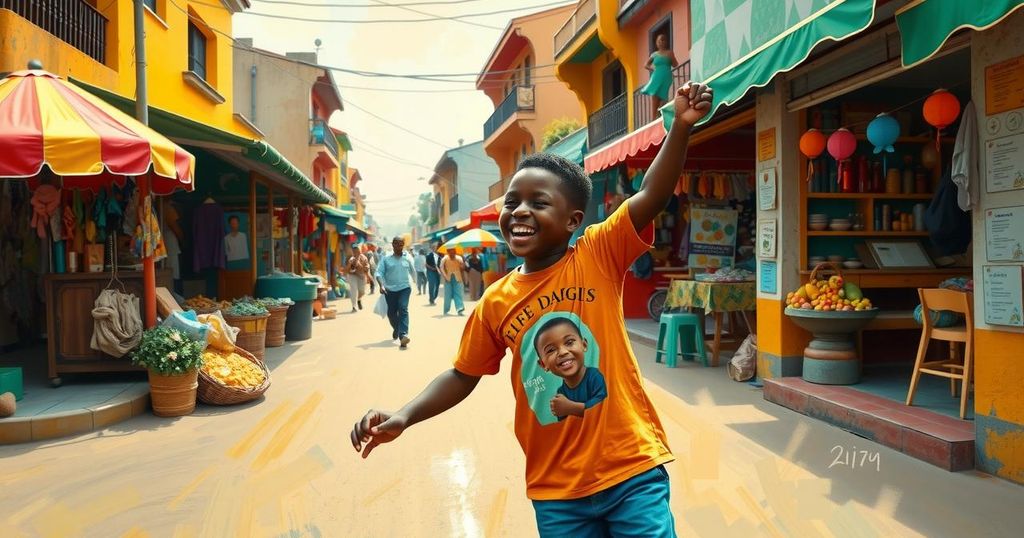‘My Father’s Shadow’ Review: A Stirring Ode to Lagos and Nigerian Cinema
Akinola Davies Jr.’s debut film “My Father’s Shadow” is the first Nigerian entry at Cannes, capturing the story of two brothers on a pivotal election day in Nigeria, allegorizing personal relationships against a backdrop of political turmoil. The film evokes a blend of childhood innocence and political urgency through its lyrical direction and intimate storytelling.
Akinola Davies Jr. marks a significant milestone for Nigerian cinema with his debut film, “My Father’s Shadow,” which is notably the first film from Nigeria to be showcased at the Cannes Film Festival. Set against the backdrop of June 12, 1993, when Nigeria held its first post-coup election, the film presents a poignant story about two young brothers, Akin and Remi, navigating their mundane day while a crucial political event unfolds around them.
The film opens with Akin (Godwin Chimerie Egbo) and Remi (Chibuike Marvellous Egbo) engaging in familiar childhood disputes over toys, all while facing the relentless heat of Lagos. What may appear like just another day soon shifts dramatically when their father, Folarian, portrayed by Sopé Dirisu, enters the scene in an emotionally charged manner, sparking a rift between the boys and their stern father.
Davies Jr. employs a lyrical approach reminiscent of acclaimed filmmakers such as Raven Jackson and RaMell Ross, and he adeptly employs the stylistic influences of earlier Black directors. With the melancholic sounds of their environment—flies buzzing and leaves rustling—Davies Jr. immerses viewers in a world colored by childhood innocence and impending historical change.
Folarian, frustrated with his sons for losing a watch, decides to take them to Lagos, hoping to enhance their emotional bond amid the swirling political climate. Their journey via the danfo bus exposes them to the bustling life of the city, replacing the quiet of their home with the voices of passionate passengers discussing the election’s political gravity, including tragic news of a military massacre.
As they traverse Lagos, Akin and Remi discover fragments of their father’s past through stories shared by his friends, although the episodic storyline might leave viewers yearning for more context. The film shines in its intimate moments between the father and his sons, despite occasionally leaning into sentimental territory, which the sheer strength of performances help to redeem. Dirisu’s portrayal of Folarian captures the character’s internal struggles effectively, showcasing a father torn between personal and political obligations.
The film’s advancing pace shifts from leisurely to tense as election day draws to a close. A sense of urgency permeates the city, particularly when Folarian fears for his sons’ safety amid curfews and military presence. The film’s editing intensifies this atmosphere, mirroring historical events surrounding the election’s annulment and the resulting violence.
In these closing sequences, Davies Jr. weaves together personal and national narratives, likening the struggles of his characters to the broader context of political disillusionment. The film’s final act stands as a powerful testament to both familial and national fragility—an impressive debut for Davies Jr. and an essential addition to the canon of Nigerian cinema.
“My Father’s Shadow,” Akinola Davies Jr.’s debut film, brings a fresh and emotional perspective to Nigerian cinema, highlighting the interconnectedness of personal experiences and national history. It shines a light on the struggles within a family, paralleling the broader political turmoil of Nigeria in 1993. As the first Nigerian film at Cannes, it heralds a new chapter for filmmakers from the region, showcasing an impressive blend of storytelling and artistry that resonates deeply with viewers.
Original Source: www.hollywoodreporter.com




Post Comment